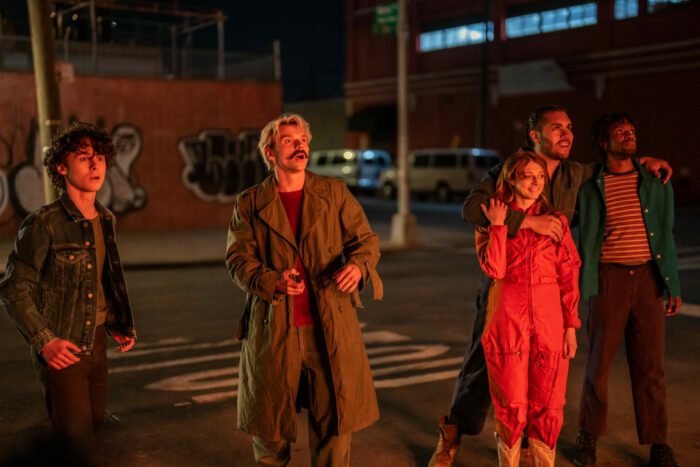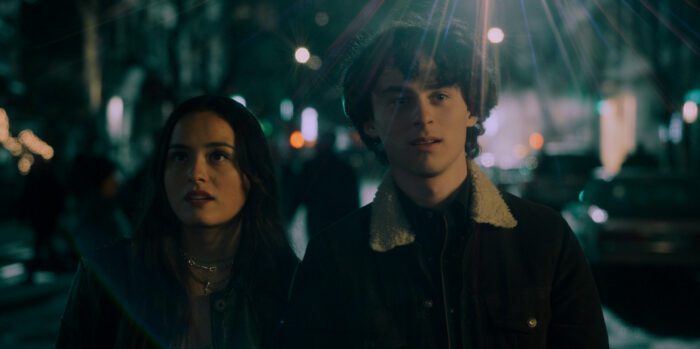Based on the debut novel, City on Fire, by Garth Risk Hallberg from 2015—not to be confused with Don Winslow’s novel of the same name—Apple TV+’s newest series takes liberties with this adaptation.
What was originally set in 1970s New York City is now 2003, and what was New Year’s Eve has become the 4th of July. Despite the praise for Garth Risk Hallberg’s City on Fire, the show may not live up to the high expectations of a thrilling and suspenseful mystery about class politics and disparity in one of America’s greatest cities.
From the producers of Gossip Girl and The O.C. (two shows I loved, BTW), Stephanie Savage and Josh Schwartz, we get a slightly confused plot structure for the first three episodes, which premiered together on May 12. The rest of the series will be released weekly in singular episodes. A curious game plan for Apple TV+, but I wonder if any of it has to do with the sheer lack of cohesion with the first three episodes. The pilot, “We Have Met the Enemy, and He Is Us,” is fine, the second episode, “Scenes from Private Life,” is painfully taped together, and the third episode, “The Family Business,” is a weak promise for answers to questions we do not understand.

Yet, despite combing through the mess of sporadic character pairings and storylines that miraculously cross, I found performances from the high-calibre cast extremely captivating.
It’s frustrating because William (Nico Tortorella) is a frighteningly accurate portrayal of a struggling addict, and the focus on his relationship with Mercer (Xavier Clyde) morphing into his reunion with sister Regan (Jemima Kirke) is compelling in the most inconvenient way for the supposed main plot of this series. How everything is framed, we’re supposed to be obsessed with Samantha (Chase Sui Wonders) because she’s somehow at the centre of this web of lies, deceit, fires, music and art. Still, so much of what we’re shown to fill in the blanks plays out much more as a distraction than an explanation.
Nico Tortorella is giving a main character performance, and Jemima Kirke is feeding off that energy. Their backstory and family history are thinly veiled. They make for a Succession-themed storyline about a wealthy urban family whose fortune and turmoil can all be tied back to their infamous corporate legacy edging borderline criminal strategy and wealth.
It all must connect to the pyro-vigilante group Samantha fell into, but the ties keeping the episodes together are mismatched, and the episodes barely have their own arcs.
What started out as Charlie (Wyatt Oleff), the grieving nerd fancying Samantha as his very own manic pixie dream girl, quickly derails, again, from the original plot. At first, it was giving John Green Looking for Alaska or Paper Towns. Then, suddenly, Charlie’s distracted from his mystical woman by the poorly motivated local punk bombers who fight wealth disparity by burning down buildings that could have given shelter to squatters and never communicating their demands to economic powers. This pulls us back to the notoriously wealthy family. They exiled their gay addict artistic prodigy, William. And then there’s his sister Regan’s husband Keith (Ashley Zukerman) delivering suspiciously money-stack-shaped packages to these rebels. Really, it’s just setting fires at this point; I don’t see how they are helping anyone besides insurance companies or real estate moguls.

See, these are connected but in ways that make my brain hurt. These connections and coincidences are meant to mean something more profound and beg questions about the power of elite members of society. Yet so far, the portrayal of the underground players feels superficial and lacks substance enough to be the edgy counterculture it’s meant to project. Everything is thinly coated in this anti-patriarchy, anti-capitalist, fight-the-machine vocabulary and ideas, but it’s wayward and confused in the motive of this group.
Maybe we don’t have it all figured out. Maybe we’ve been led astray by clever writing. Maybe Amory (John Cameron Mitchell), the step-uncle of Regan and William, who just so happens to secure himself as interim CEO while Regan’s father awaits trial, isn’t the orchestral party planner for the criminal web we’re trying to dismantle as the third episode, “The Family Business,” led us to believe. Maybe there’s more to the story. Maybe Amory is bluffing. Maybe Regan’s child, who snuck out in the pilot, shot Samantha while playing with a gun in the Park. Maybe Keith is bluffing, and he shot Samantha in the Park. Maybe one of the pyro punks shot Samantha in the Park. There are still plenty of loose ends.
However, the writing team is still mismanaging this mystery. I think the story would have been better off framed through a single character’s POV or given some sort of throughline-like narration or better flashbacks and forwards. The way this story is being told now, it’s hard to tell who the main character is, which story is the most important, and what the purpose of the whole thing is. It feels like a mess—not a good one like you want a mystery to be, but a miscalculated arrangement of facts that overcomplicate everything.
I wonder if the writers want a second season. From what I understand of the base premise, this story would make for a great mini-series. Still, with how Stephanie Savage and Josh Schwartz set up the storylines and introduce characters, I wonder if they want longer legs for this world of fire, fraud and found family.
Nevertheless, like I said previously, the performances in this show carry its clutter, and I’m excited to see how the rest of the series will shape with the actors’ spectacles to distract us from the conflict in disarray.

